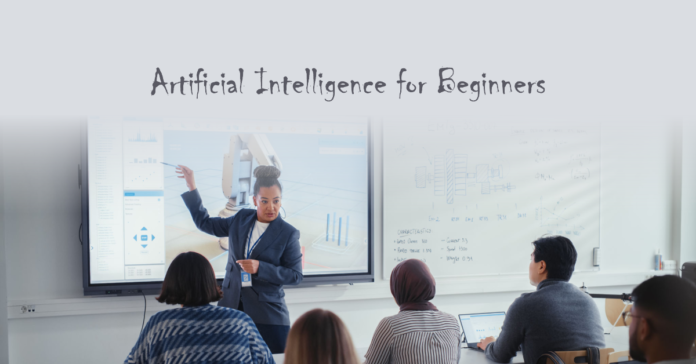Did you ever think about how self-driving cars work or how automated helpers understand what you’re asking for? The feedback is found within the vast field of Artificial Intelligence (AI). This guide for beginners will simplify this difficult, sensitive area into manageable ideas by looking at its definition, key elements, applications, and ethical implications.
What is Artificial Intelligence?
AI is a branch of computer science that focuses on creating machines capable of performing tasks that typically require human intelligence. For instance, if you could make a computer solve problems, learn from experiences, understand language, and even make decisions, then that’s what we call AI.
Building Blocks of AI: Core Components
Various AI technologies power these fundamental components.
- Learning: Just like humans, AI systems can learn and memorize information. For example, this could involve remembering specific items, understanding patterns, or mastering languages.
- Reasoning: AI goes beyond memorization by enabling computers to draw conclusions and make inferences from data.
- Problem-Solving: AI can tackle complex challenges by analyzing information and applying learned knowledge to find solutions.
- Perception: Through artificial “senses” like computer vision, AI can perceive and interpret its environment.
- Language Understanding: Thanks to Natural Language Processing (NLP), AI systems can understand and communicate using human language.
Various AI technologies, including the following, power these components:
- Machine Learning (ML): This crucial subset of Artificial Intelligence empowers computers to learn from data without explicit programming, essentially teaching themselves to improve over time.
- Deep Learning (DL): A more specialized form of ML, DL uses artificial neural networks inspired by the human brain to analyze vast amounts of data and extract complex patterns.
- Natural Language Processing (NLP): NLP focuses on enabling computers to understand, interpret, and generate human language, bridging the gap between humans and machines.
- Computer Vision (CV): Just as our eyes help us understand the world, CV allows AI systems to “see” and interpret visual information from images and videos.
- Robotics: Specifically, this field combines AI with engineering to create intelligent robots capable of performing physical tasks autonomously or semi-autonomously.
- Expert Systems: These AI systems leverage a vast knowledge base within a specific domain to make decisions and provide expert-level advice.
AI in Action: Real-World Applications
AI is not just a futuristic concept; it’s already transforming various aspects of our lives:
- Healthcare: AI assists doctors in diagnosing diseases earlier, predicting patient outcomes, and developing personalized treatment plans. Imagine a future where AI helps discover life-saving cures!
- Finance: AI is revolutionizing finance by detecting fraudulent transactions, automating investment strategies, and providing personalized financial advice.
- Transportation: Self-driving cars are no longer science fiction! AI is powering autonomous vehicles, making transportation safer and more efficient.
- Education: AI personalizes learning experiences, providing students with customized lessons and feedback tailored to their needs.
- Manufacturing: AI optimizes production processes, predicts maintenance needs, and improves product quality, leading to greater efficiency and cost savings.
- Marketing: AI analyzes customer data in order to deliver targeted advertising, personalize marketing campaigns, and enhance customer experiences.
A Look Back: The Evolution of AI
The concept of AI has been around for centuries, with philosophers and inventors imagining machines capable of mimicking human thought. To illustrate this rich history, here are some key milestones in AI:
- Early Concepts: From ancient Greek myths about automatons to the invention of mechanical calculators, humans have long been fascinated by the idea of artificial intelligence.
- Foundational Work: Visionaries like Ada Lovelace and Alan Turing laid the groundwork for AI in the 19th and 20th centuries with their pioneering work on computation and algorithms.
- The Birth of AI: The term “Artificial Intelligence” was officially coined at the Dartmouth Conference in 1956, marking the beginning of AI as a formal field of study.
- Significant Breakthroughs: IBM’s Deep Blue defeating chess grandmaster Garry Kasparov in 1997 and Google’s AlphaGo beating a professional Go player in 2016 showcased the remarkable progress of AI in game-playing.
- The Rise of Generative AI: The development of powerful language models like GPT-3 by OpenAI has ushered in a new era of generative AI, capable of creating human-quality text, images, and even music.
Navigating the Ethical Landscape of AI
As AI becomes increasingly sophisticated, it’s crucial to address the ethical considerations surrounding its development and deployment:
- Bias in AI: AI systems are only as good as the data they are trained on. If training data reflects existing societal biases, AI algorithms can perpetuate and even amplify these biases.
- Transparency and Explainability: Many consider AI algorithms to be “black boxes” because their decision-making processes are opaque and difficult to interpret. This lack of transparency raises concerns about accountability and fairness.
- Job Displacement: As AI automates tasks previously performed by humans, there are concerns about potential job displacement and the need for workforce retraining and adaptation.
The Future of AI: A World of Possibilities
AI will continue its rapid growth, fueled by advancements in quantum computing and neuromorphic engineering. However, OpenAI remains cautious about releasing advanced models like GPT-4 due to safety and ethical concerns.
Are you interested in learning more about AI? This introductory guide offers a basic understanding of what AI is. For those who want to delve deeper into the subject, there are many sources available both online and at libraries that explore the potential of AI and its impact on our future.


